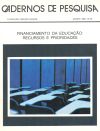Tempo conceitual e sucesso escolar
Keywords:
Rendimento escolar, Desenvolvimento cognitivo, AprendizagemAbstract
A relação entre reflexão/impulsividade (conforme avaliada pelo teste de Combinação de Figuras Familiares elaborado por Jerome Kagan) e qualidade de desempenho escolar, foi examinada em 298 crianças de 1ª série. Procedimentos para determinar a validade e fidedignidade do referido teste foram utilizados. Os principais resultados da pesquisa indicam: (1) a existência de uma correlação inversa entre latência de resposta e número de erros; (2) crianças reflexivas apresentam melhor desempenho escolar que as impulsivas. Dados relativos a outros estilos de resposta foram incluídos numa tentativa de se obter melhor compreensão dos fatores que influenciam a qualidade de desempenho escolar. Métodos alternativos de classificação dos sujeitos foram também utilizados e seus resultados comparados. Os dados têm implicações para o entendimento da natureza dos diferentes níveis de desempenho escolar constatados em alunos de 1ª série, bem como sugerem a necessidade de estratégias educacionais específicas para o desenvolvimento das habilidades reflexivas do pensamento.Downloads
Downloads
Published
How to Cite
Issue
Section
License
Copyright (c) 2013 Cadernos de Pesquisa

This work is licensed under a Creative Commons Attribution-NonCommercial 4.0 International License.
Authors who publish in this journal agree to the following terms:
a. Authors retain the copyright and grant the journal the right to first publication, with the paper simultaneously licensed under the Creative Commons Attribution license that allows the sharing of the paper with acknowledgment of authorship and initial publication in this journal.
b. Authors are authorized to assume additional contracts separately, for non-exclusive distribution of the version of the paper published in this journal (for example publishing in institutional repository or as a book chapter), with acknowledgment of authorship and initial publication in this journal.
c. Authors are allowed and encouraged to publish and distribute their paper on-line (for example in institutional repositories or on their personal page) at any moment before or during the editorial process, as this can generate productive changes, as well as increase the impact and citation of the published paper (See The Effect of Open Access).









